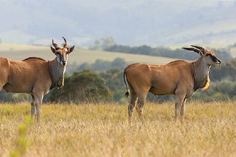 I never saw myself as closing your eyes to reality. But I admit that I switch to a channel about animal documentation, when the news is unbearable or feature films too banal to interest. There is something really good about watching the gamekeepers catching wild animals, if necessary, sometimes medically treating them and even moving entire flocks to another area where the environment gives them better living conditions. The game wardens often risk their lives when lions, hippos or rhinos must be stunned. Of course, they work in teams and every step is planned and executed with the necessary equipment. But sometimes it's up to scratch to see if a treatment ends well.
I never saw myself as closing your eyes to reality. But I admit that I switch to a channel about animal documentation, when the news is unbearable or feature films too banal to interest. There is something really good about watching the gamekeepers catching wild animals, if necessary, sometimes medically treating them and even moving entire flocks to another area where the environment gives them better living conditions. The game wardens often risk their lives when lions, hippos or rhinos must be stunned. Of course, they work in teams and every step is planned and executed with the necessary equipment. But sometimes it's up to scratch to see if a treatment ends well.
I remember one campaign that was particularly well planned and went well. A team of experts set up a "trap" for a herd of eland that had to be relocated to another area. There she should find better grazing land and mix with another herd to improve her genetics. What really captivated me was seeing how they managed to get a herd of strong, fierce, fast-running animals to get into the waiting vans. This was accomplished by erecting cloth barriers held in place by poles. The animals were gradually locked in so that they could be carefully pushed into the waiting transporters.
Some proved difficult to catch. However, the men did not give in until all animals were safely housed in the transporters. It was worthwhile to see how the animals were released to their new home, where they could live freely and better, even though they were not even aware of it.
I could see that there is a similarity between the men who save these animals and our Creator, who lovingly leads us on the path to his perfect eternal salvation. Unlike the Eland antelopes in the game reserve, we are aware of the blessings of God both in this life and in the promise of eternal life.
In the first chapter of his book, the prophet Isaiah laments the ignorance of God's people. The ox, he writes, knows his master and the donkey his master's manger; but God's own people neither know nor understand (Isaiah 1,3). Perhaps this is why the Bible often calls us sheep, and it seems that sheep are not some of the most intelligent animals. They often go their own way to find better forage while the best-informed shepherd leads them to the best pastureland. Some sheep like to make themselves comfortable on soft ground and turn the ground into a hollow. This leads to them being stuck and unable to get up. So it is no wonder that the same prophet in chapter 53,6 writes: "They all went astray like sheep".
Exactly what we need Jesus describes himself as the "good shepherd" in John 10,11 and 14. In the parable of the lost sheep (Luke 15) he paints the picture of the shepherd who comes home with the lost sheep on his shoulders, full of joy at being found again. Our good Shepherd does not hit us when we go astray like sheep. With clear and gentle promptings from the Holy Spirit, he leads us back on the right path.
How merciful Jesus was to Peter, who denied him three times! He says to him: "Feed my lambs" and "Feed my sheep". He invited the doubting Thomas: "Reach out your finger and see my hands, ... do not be unbelieving, but believing". No harsh words or insults, just a gesture of forgiveness coupled with irrefutable evidence of His resurrection. This was exactly what Thomas needed.
The same good shepherd knows exactly what we need to stay on his good pasture and he forgives us again and again if we make the same stupid mistakes. He loves us no matter where we get lost. It allows us to learn the lessons we need so much. Sometimes the lessons are painful, but he never gives up.
In the beginning of creation, God intended that humans should rule over all animals on this planet (1. Mose 1,26). As we know, our ancestral parents decided to go their own way, so that we cannot yet see that everything is subject to human beings (Hebrews 2,8).
When Jesus returns to restore all things, then the people will receive the dominion God intended them to be in the beginning.
The gamekeepers who were shown on the TV show at their work had a real interest in improving the lives of the wild animals there. It takes a great deal of resourcefulness to circle the animals without hurting them. The obvious joy and satisfaction they experienced through the successful action was shown in the bright faces and the mutual shaking hands.
But how does that compare to the joy and true happiness that will be when Jesus the Good Shepherd completes the "salvation operation" in His kingdom? Can the resettlement of a few elands, which then do well for a few years, be compared to the salvation of many billions of people for all eternity? Absolutely no way!
by Hilary Jacobs
This website contains a diverse selection of Christian literature in German. Translation of the website by Google Translate.